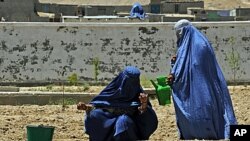Agriculture is the mainstay of Afghanistan’s economy, although only about 12 percent of the country’s land is suitable for farming. Insecurity and droughts have also hindered the country’s agricultural success, as has the lack of modern farming techniques. An American university has teamed up with one in Kabul to help update agricultural teaching methods.
The sound of a thresher in the wheat fields of eastern Afghanistan. Farmer Gholam Nabi got the machine only two years ago. Nabi says it is not easy for Afghan farmers to afford machines like this.
The government does not help us get machinery, he says. It does give us some seeds, he adds, but not enough. Nabi says the thresher has speeded up his harvest, and he believes introducing modern farming methods is the way to for Afghanistan’s farmers to become more profitable.
“If we want someone to restrain the sheep, we hold the back of the head and under the chin,” said American Sophia Wilcox. Wilcox is from US Purdue University. She is working at Kabul University with Afghan agriculture professors and students.
“We work here to improve the efficiency and production, modernize some of the skills and technology so these students can go on and build a much stronger foundation for agriculture in Afghanistan,” she explained.
Classroom study has been upgraded to include modern biology and other sciences.
And there’s a student farm, with live sheep and chickens, including an American poultry breed Wilcox imported herself -- the Leghorn. There are also fields, where students farm the land, learning how deep to plant a seed, and how often to water it. Wilcox says agriculture is crucial to Afghanistan’s future.
“Eighty-five percent of income comes from agriculture, and the whole economy of Afghanistan is not industrialized as much as it is agriculture and agricultural products,” said Wilcox.
Despite Afghanistan’s dependence on agriculture and the improved academic program at the university, the Afghan faculty says it is difficult to attract students. Agriculture professor Ewaz Khan says Afghans who have passed the university entrance exams choose other subjects, like journalism and or law.
Khan says students should pay attention to our department, too, because Afghanistan is an agricultural country. “We need to encourage people to join this faculty,” he said.
Farming is largely seen here as a subsistence business, long hindered by decades of war.
Even though insecurity remains a problem in parts of Afghanistan, much of the country is experiencing freedom of movement and commerce the nation has not enjoyed in a generation. And there is the prospect that farming could become much more profitable.
This month (June) a new transit agreement between landlocked Afghanistan and neighboring Pakistan means Afghan farmers can truck their goods directly to India or China, shaving days of transit time and opening up new markets for produce.












